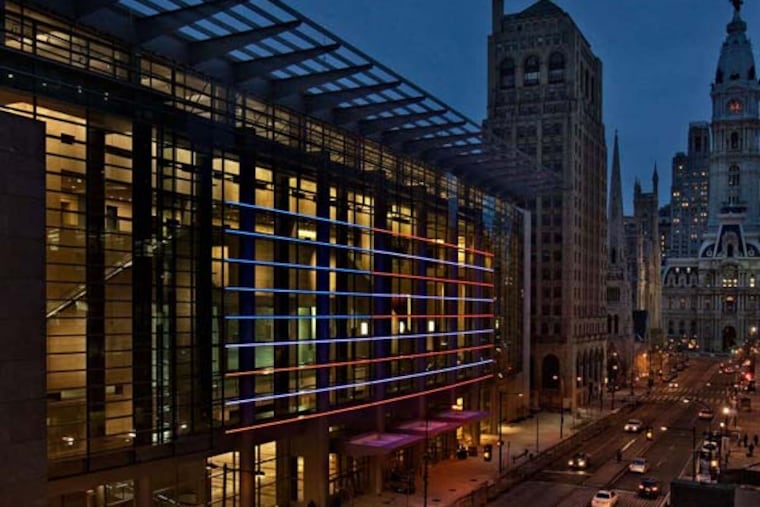With business flagging, Convention Center at a crossroads
Summer ended on a sour note at the Convention Center. And the forecast for bookings is not good. Three big trade shows - for coin collectors, lighting suppliers, and health-care and biotech companies - are not returning to Philadelphia.

Summer ended on a sour note at the Convention Center. And the forecast for bookings is not good.
Three big trade shows - for coin collectors, lighting suppliers, and health-care and biotech companies - are not returning to Philadelphia.
The big complaint: Philadelphia is a "hassle," said Jack Ferguson, president of the Philadelphia Convention & Visitors Bureau, which lines up shows for the center.
In surveys, he said, customers cited problems with labor costs and "jurisdictional issues" - and the balkanized union work rules for who does what on the convention floor.
"You can't have that mix in today's competitive world," Ferguson said. "The customer can go elsewhere."
And they are.
This year, the Convention Center will have 30 major shows, of which 20 are "citywide" events that will fill more than 2,000 hotel rooms in Center City.
Next year, the number of big shows will drop to 26, with only 16 citywides.
Beyond that, the pace of bookings weakens to about 10 citywides a year.
"We know the next three years are going to be bad, but right now we're falling further behind for the following three years as well," said Jim Gratton, president of the Greater Philadelphia Hotel Association.
Many in the hospitality trade are hopeful that recent changes in the management of the public facility will improve the situation. Last summer, the convention center authority hired a private company - SMG of West Conshohocken - to take over day-to-day operations.
SMG, a nationally recognized manager of convention centers, begins in Philadelphia next Sunday.
The company handles such major centers as McCormick Place in Chicago, Moscone Center in San Francisco, and Cobo Center in Detroit - all cities with strong unionized workforces.
Hotel operators, tourism experts, and union leaders recognize that this is a make-or-break moment for the Philadelphia center.
In 2011, the state financed a $780 million expansion, doubling the floor space. The expectation was that a larger center should attract as many as 30 big shows a year.
"If nothing else, we all agree that if we don't get shows, we don't all have jobs," said Robert McClintock, SMG's senior vice president of convention centers.
Labor issues "are vitally important to get resolved - whether having to do with jurisdiction, productivity, or, very simply, attitude," he said.
"You want people to feel that producing a show is easy," he said. "And when you make it more difficult for them - with labor, or building management, or operational teams - that's a hurdle for them."
Pat Gillespie, business manager of Philadelphia's Building and Construction Trades Council, said unions have been advocating for "proper management" of the center, rather than political appointees.
"SMG promises good leadership," Gillespie said.
As for labor costs, he said the building trades were "tired of being the scapegoat."
Union officials said some of the big shows that are leaving Philadelphia need more space and are going to New York's Jacob K. Javits Center.
A chronic complaint of exhibitors are the restrictive rules over who can do what in setting up and taking down exhibits.
John Dougherty, business manager of Local 98 of the International Brotherhood of Electrical Workers, said he had been "crying for privatization for 15 years."
He said one of the areas that has to improve is communication between executives on the second floor and people working on the show floor.
"We're hoping Bob McClintock acts like the boss, and if there's a problem - and a consistent problem - Bob's got to get rid of it," Dougherty said. "There's no on-the-floor leadership."
In advance of the management change, officials for SMG and the visitors bureau have reached out to show planners across the country. And the bureau is running ads in trade publications that promise exhibiting "is about to become even easier."
Ferguson said many show planners were waiting to see if "Philadelphia gets its act together" before deciding whether to come back.
Gratton said the hiring of SMG was "a great first step." But it would be "naive to think SMG by itself will solve everything," he said.
He added, "Meeting planners have told us, 'Philadelphia has said this before and not delivered.' "
215-854-5659 @j_linq